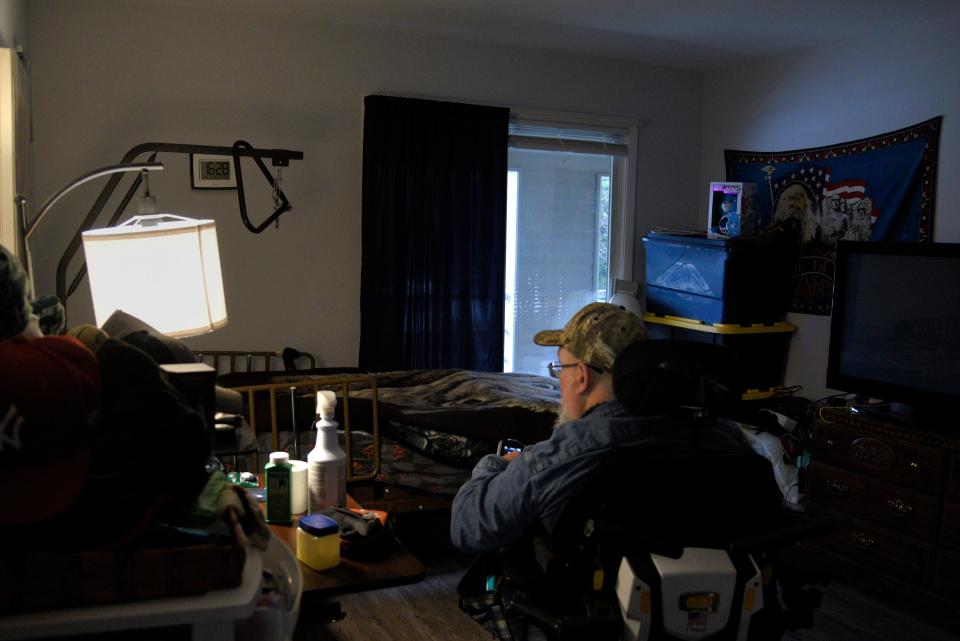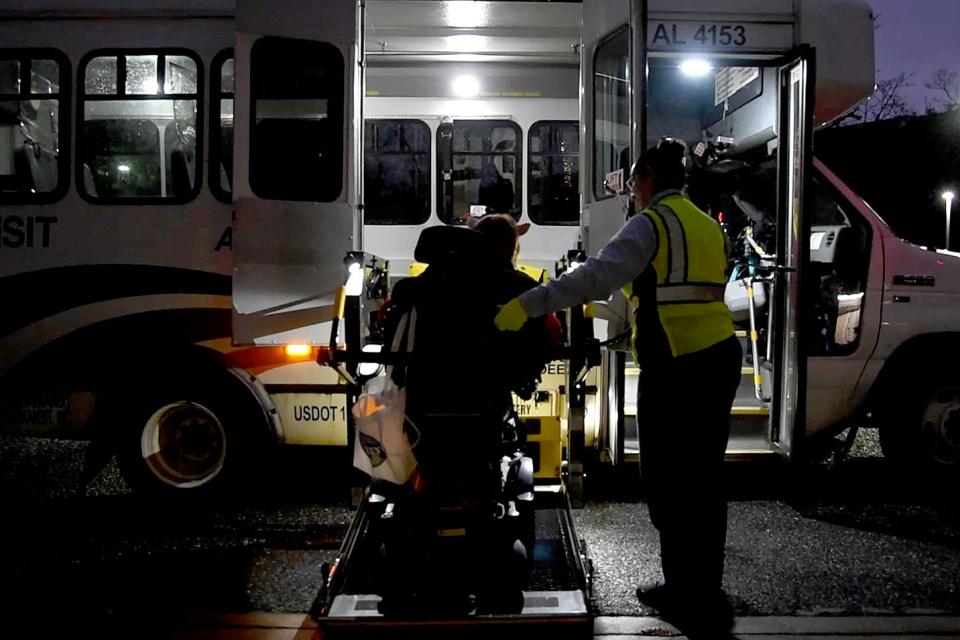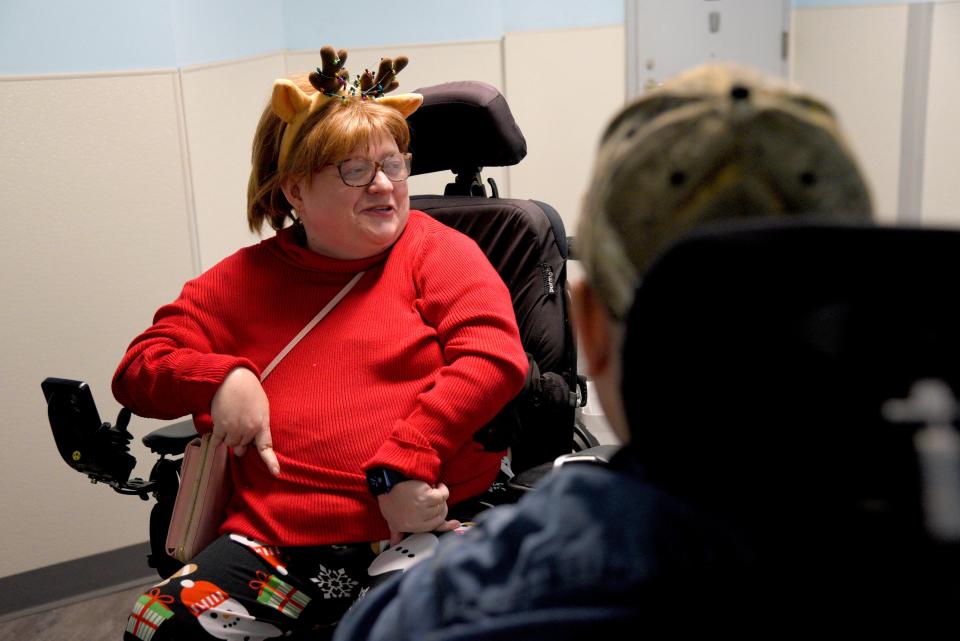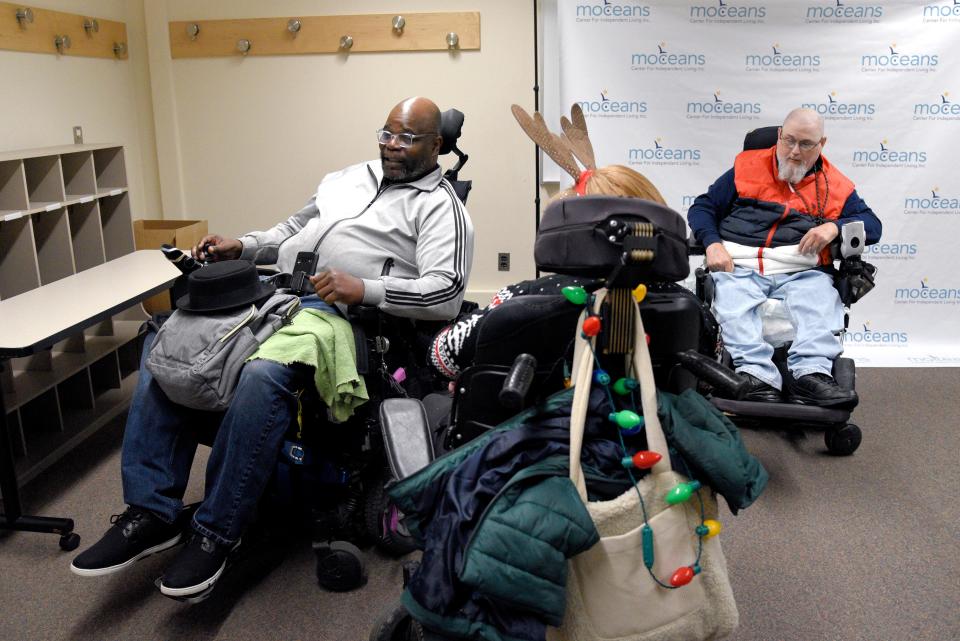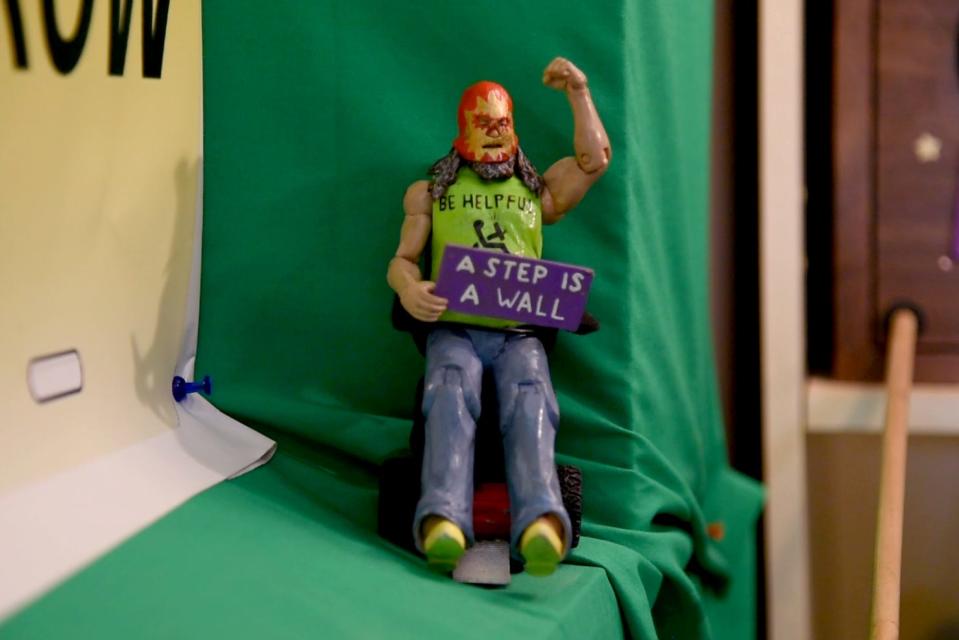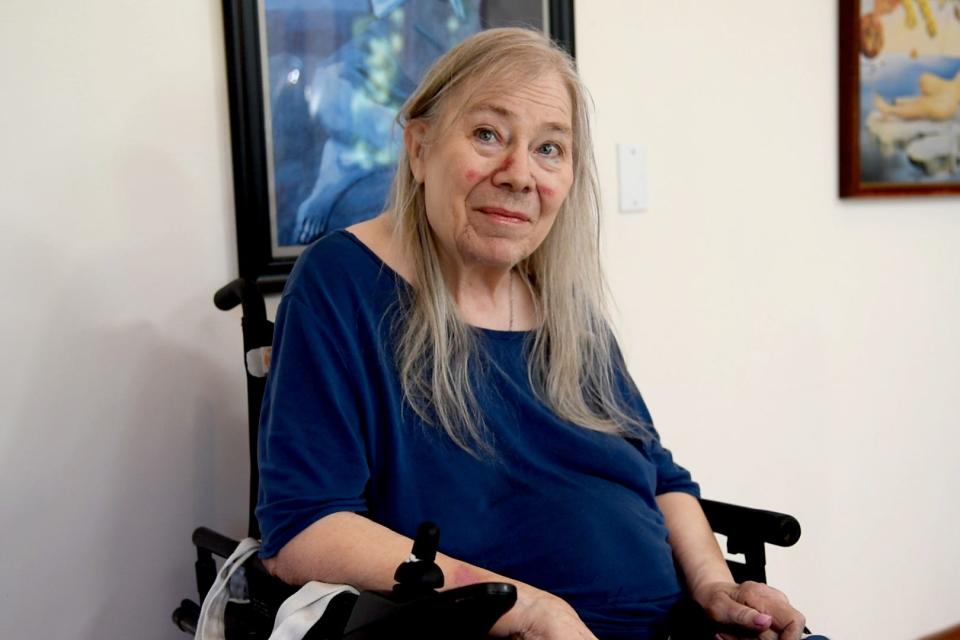Stanley Soden of Long Branch was heading down Lowden Court to pick up groceries for himself and two neighbors in his apartment building. Despite the sidewalks that line Monmouth Medical Center on his right, Soden, who uses a motorized wheelchair, was riding on the street next to cars and trucks.
The reason? For Soden, sidewalks can be less safe than streets. At a few curb cuts leading down the sidewalk along Lowden Court, puddles and potholes have the ability to tip his wheelchair.
That is one of the many barriers wheelchair users face to fully participating in the communities where they live.
Over 30 years since the Americans with Disabilities Act was signed into law, disability advocates are still fighting for equal access, with the federal law enforced haphazardly.
'Difficult to get cash': 'Difficult to get cash': NJ bank branch closings raise roadblocks for disabled people
“Unless you’re in a wheelchair or you know somebody in a wheelchair, you know somebody who’s sick, it doesn’t affect you,” said Edward Lefty Grimes, a disability rights advocate. “And until it affects you, you’re not going to be bothered with it.”
For people with disabilities such as Soden, community integration has not always been a goal. When he was born in 1961 with cerebral palsy, doctors recommended placing him in an institution. But as the miracle child after three miscarriages, his parents wanted to raise him themselves.
During the decades Soden grew up, disability rights advocates began to gain traction in their demands to deinstitutionalize disability and staged sit-ins in federal buildings until Section 504 of the Rehabilitation Act of 1973, which would prohibit discrimination on the basis of disability in programs receiving federal funding, was signed into law.
When Soden was set to go to high school at Red Bank Regional, he nearly missed a whole year of school as the school boards of Red Bank and Long Branch fought over transportation costs for him.
“(My mom) was one of my biggest supporters,” Soden remembered. “She said they’re just fighting over money, and they’ll just figure it out.”
Hours on the bus
When Amanda Chirelli of Little Egg Harbor, who also has cerebral palsy and uses a wheelchair, was set to go to school in the 1980s and '90s, the school board wars of Soden’s time were over. She saw the passage of the Americans with Disabilities Act, which was adopted in 1990 and changed the built world. Handicap parking spaces, wider bathrooms and paratransit services were among the many changes that came about.
Chirelli relies on NJ Transit’s Access Link, the state's paratransit service for customers with disabilities. Access Link buses follow the same routes and schedules of certain NJ Transit fixed-route buses, but are allowed to deviate up to three quarters of a mile from the bus route. This allows customers with disabilities to be picked up at their homes and dropped off directly at their destinations. She praised Access Link, but wished there could be more times, more service areas and faster rides.
On a recent trip to visit friends at Soden’s apartment building in Long Branch for people with developmental disabilities, Chirelli set off from home at around 9 a.m., reached a bus depot around 9:30 a.m., transferred to another Access Link bus around 11:30 a.m. and reached Soden’s apartment building around 12:30 p.m. That same route would take a typical able-bodied driver an hour to an hour and a half to complete.
Who will fix it?Hundreds of bus stops are unmarked in Monmouth, Ocean, confusing riders
"I am fortunate enough to have public transportation," Chirelli said, noting that many people with disabilities live outside its coverage zone. She said Access Link has given her the ability to have a social life and head into the office when needed.
But there are many places she would like to go to that are outside Access Link's coverage area. For example, if Chirelli wants to attend her Thursday night church group in Barnegat, she needs to ask her parents to drive her to the service.
On Dec. 22, NJ Transit reached a settlement agreement with the U.S. Department of Justice to improve its Access Link services. The agreement said that many Access Link customers faced excessively long trips, late pickups, late dropoffs and excessive hold times on the phone, a way in which customers book rides.
NJ Transit has also received federal funding from the U.S. Department of Transportation in December to make Newark Penn Station, Princeton Junction, MetroPark, Trenton and New Brunswick train stations accessible for people with disabilities.
While Chirelli can bypass some of Access Link's issues by leaning on her parents, Soden said, “Some people don’t have family. … They have to rely on the supports that they have around them. It can be a bit of a challenge.”
Supports including individual connections, disability-oriented programs and the physical structure of the built world. Chirelli said there are government sponsored programs, but many are not well advertised. She said the system is a patchwork.
In addition to Access Link, each county and certain municipalities in New Jersey have their own internal transportation services. Ocean County operates Ocean Ride and Monmouth County operates SCAT. Chirelli said she doesn’t use the other transportation services as much as Access Link because of their limited hours that would restrict what she can and cannot do.
Living someone else's experience:Holmdel birthday meal takes away sight and sound to teach about Usher syndrome
She said the state Department of Developmental Disabilities also provides a list of vetted accessible transportation vendors for people with developmental disabilities, but decided against using those services because of cost and the vendors' preference for customers who travel multiple times a week on fixed schedules.
"I would compare private vendors to a limo," Chirelli said.
Soden noted that prices range for private vendors and some charge additional fees for using its ramps on top of a fare for every mile traveled.
But being able to get from one place to another does not guarantee access. The ADA compelled newer buildings to be built with disabilities in mind, but many older buildings continue to be inaccessible.
With the exception of private homes and historic buildings, most older buildings, including structures publicly and privately owned, need to be retrofitted to comply with ADA requirements. However, many municipalities do not prioritize enforcement.
'Live life to the fullest'
Wali Mohammed used to work in construction. He said his company would make new buildings accessible from the beginning and modify existing buildings to comply with accessibility requirements.
Then in 2001, Mohammed was in an accident on Route 36 in Eatontown and was left paralyzed from the chest down. He is capable of driving a car but relies on a motorized wheelchair to get around.
“There is a lot to do in life,” Mohammed said. “As long as I can get in this chair, (I’m) able to live life to the fullest.”
'Take a chance with me': Sea Girt man with cerebral palsy starts disabled job placement
Soden, Chirelli and Mohammed are coworkers at MOCEANS Center for Independent Living in Long Branch, which connects people with disabilities in Monmouth and Ocean counties to transportation, housing and employment resources for free.
Part of Mohammed’s job with MOCEANS is to conduct site inspections. He said each municipality in New Jersey approaches ADA differently.
In Monmouth and Ocean counties, only a handful of municipalities have a designated employee or committee that addresses disability issues.
Keyport, Middletown, Jackson and Stafford have either an ADA compliance officer or a specific person to contact such as the township administrator about access issues.
Belmar, Matawan, Lakewood, Lavallette and Toms River have committees or community partnerships focused on issues that people with disabilities face. In other municipalities, the human relations committees or the code enforcement departments handle ADA compliance issues.
However, enforcement varies widely. Older municipalities such as Asbury Park, where Mohammed lives, are less accessible than municipalities with newer infrastructure.
A big foodie, Mohammed said he often relies on word of mouth to determine if the recommended restaurants are accessible to him and that even then, he estimates about 20% are not accessible when he arrives. Due to a lack of enforcement, local governing bodies do not keep track of the number of places that are genuinely accessible.
He said sometimes places are labeled as accessible because a wheelchair can enter the building, but then lack a path to the performance hall or lack an accessible bathroom.
“In terms of the ADA, we still have momentum, a lot of our policies with the ADA haven’t rolled back. And we still have people working on that,” Mohammed said. “But it can be pushed on a little more and tweaked a little more.”
Medical breakthrough: How first-of-its-kind implant may read mind of paralyzed NJ man
'We're going to go back there again'
Grimes lives in Bayonne, a city full of stairs. Even getting into a ground-floor store often requires stepping over a raised threshold.
Grimes, who injured his back and shoulder while working, has had numerous surgeries that had left him taking Roxicodone every three hours.
“(It) is an incredible amount of opioids,” he said, and it took him 10 months and four tries to wean himself off the painkillers.
If Grimes’ body feels OK for walking, he walks. If his body doesn’t, he rides around in a motorized wheelchair.
Grimes remembers traveling in Englewood with a friend and traveling past blocks and blocks of stores and restaurants before finding a single restaurant that was wheelchair accessible.
“It was the best Thai food we ever had,” Grimes said. “We would never have experienced that, had they not had a ramp. But since they had a ramp, we went in there and experienced one of the greatest meals we ever had and we’re going to go back there again.”
Grimes said he has seen parking labeled "accessible" despite having no curb cuts and "accessible" signs on doors that led to stairs. He said he has gone to politicians' offices that lack access and was kept from candidate forums because of physical barriers.
Grimes said people with disabilities have been advocating for hybrid town meetings available online for years so their concerns can be voiced. And he finds it frustrating that it was only when the pandemic began causing able-bodied people to get sick that municipalities began adopting online options for local town meetings.
But Grimes said he understands the apathy. His aunt who lived across the street in Bayonne had a disability and was homebound.
“I just thought, ‘Aunt Helen just doesn’t leave the house,’” Grimes said. “But there was nothing available for her to go to.”
'I wouldn't have changed it': Amputation led to AMP'D Fitness in Brielle
Confrontational activism
Judyth Brown, the executive director of MOCEANS, said she came to disability activism after finding out in her previous marketing job that people with disabilities were some of the best employees for social media. She said people with disabilities are an underemployed population.
"Lots of people see disability as an inconvenience," she said. "There’s kind of a morality piece to this. So dedicating resources to (accessibility) that people don’t see as legitimate is really rough."
She pointed at Access Link, which deviates from fixed bus routes to accommodate people with disabilities, but is limited in scope. "So what is it like to not have adequate access to work? Imagine having to commute and depend on resources that actually won’t come and get you."
Grimes came to disability activism through cannabis activism with the nonprofit group Sativa Cross. He found that many medical marijuana users also had mobility disabilities and used the same strategies of cannabis activism to address wheelchair access.
Grimes’ group would always make a scene. Whether wearing a wrestling mask and a bong costume or singing songs, Grimes’ approach to activism is confrontational. While most wheelchair users have a mental list of inaccessible places that they end up avoiding in the future, Grimes’ crew would go to those places and demand to know why it hasn’t been made accessible.
Grimes said the Jersey City office of Assemblywoman Angela McKnight, D-Hudson, representing New Jersey's 31st district, lacked a ramp until his group confronted her office. The Mrs. Fields shop in Bayonne bought a ramp after Grimes wrote to its corporate headquarters. And he said he gave the beauty store Childish Glow in that city a ramp from Amazon.
“The people that fight with us are always the ones that get the ramps, which is uncanny,” Grimes said. He said, in his experience, the people who smile and sidestep his confrontation never end up supplying a ramp.
While he said it is important to spread awareness about wheelchair accessibility, he hopes local municipalities would pass ordinances that would compel public places like post offices, police stations, restaurants and pharmacies to become wheelchair accessible. He also hopes there could be an app to crowdsource input about areas of accessibility.
The next generation
Carolyn Schwebel of Middletown grew up in rural Vermont in the 1950s. Born with cerebral palsy, she experienced a range of mobility throughout her lifetime. In her youth, she could walk, which kept her in her two-story public high school, and now, in her retirement, she uses a wheelchair.
From the time she was young, her family fought against outsiders' expectations of what she can and cannot do.
She eventually received a bachelor’s degree in English, a master’s in counseling and a doctorate in school psychology. She even got married and worked in the Middletown school district, retiring in the mid-2000s.
During her work with the school district, she found that her disability allowed her to connect with the next generation of children with disabilities, who often faced the same hurdles she did.
Schwebel successfully sued the Red Bank Public Library in the early 2000s with her friend Carmena Caivano-Stoney for not complying with the ADA.
"The kids' library was not accessible," she said. "It had steps going down and they hadn’t really thought about that until we mentioned it."
Schwebel also sued the borough of Red Bank and Riverview Medical Center for a lack of accessibility. In 2007, Schwebel sued the township of Middletown. The settlement compelled the township to hire an ADA compliance officer. People are now able to file complaints about inaccessibility directly to that office and the township now has an ADA transition plan.
The first step, identifying which township facilities are not accessible for people with disabilities.
“The little kids that are coming up,” she said. “Someone’s got to speak for them.”
Olivia Liu is a reporter covering transportation, Red Bank and western Monmouth County. She can be reached at oliu@gannett.com.
This article originally appeared on Asbury Park Press: Americans With Disabilities Act anniversary: still a fight for access
